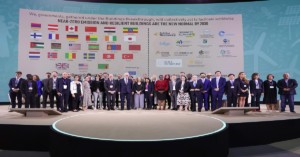Physical Address
23,24,25 & 26, 2nd Floor, Software Technology Park India, Opp: Garware Stadium,MIDC, Chikalthana, Aurangabad, Maharashtra – 431001 India
Physical Address
23,24,25 & 26, 2nd Floor, Software Technology Park India, Opp: Garware Stadium,MIDC, Chikalthana, Aurangabad, Maharashtra – 431001 India

On the seventh day of COP28, which took place on December 6, pivotal discussions unfolded surrounding the intersection of urbanization and climate change. The day witnessed crucial decisions being made and notable partnerships forged to address the pressing challenges posed by the urban environment in the context of climate change. The deliberations underscored the significance of collaborative efforts and marked a key juncture in the conference’s agenda, emphasizing the need for comprehensive strategies to tackle climate issues within urban landscapes.
On December 6 in Dubai, more than 40 ministers convened to support subnational climate action and, in collaboration with the COP28 Presidency, unveiled a series of partnerships. These initiatives are aimed at expediting the transition to net-zero and enhancing climate resilience in urban areas.
The announcements cover various sectors, including buildings, waste and resource management systems, urban water resilience, and urban nature restoration. These developments follow the launch of the Coalition for High Ambition Multilevel Partnerships for Climate Action (CHAMP) on December 1, which focuses on involving cities and regions in the formulation of federal climate commitments and strategies.
Dr. Al Jaber,the President of COP28, emphasized the crucial role of mayors and governors in achieving the goals of the Paris Agreement, underscoring the need for their leadership and support. COP28 has empowered leaders and communities by introducing CHAMP and collaborating with organizations like UN-Habitat and Bloomberg Philanthropies to acknowledge and bolster the significant contributions cities and their leaders can make in addressing climate change.
The second Urban Climate Ministerial, hosted by Multilevel Action, Urbanization, Built Environment, and Transport Day, marked the conclusion of a week of unprecedented mayoral and gubernatorial participation in the COP process. Brazil’s Minister of Cities, HE Jader Barbalho Filho, announced plans to broaden participation and mobilization for the Ministerial at COP30.
During COP28, the COP28 Presidency and Bloomberg Philanthropies jointly organized the Local Climate Action Summit (LCAS) on December 1-2. Over 500 subnational leaders participated, and nearly USD $500 million in new city-focused climate investments were announced.
Key outcomes on December 6 include:
The Buildings Breakthrough:
Launched with the backing of 27 countries and led by France and Morocco, this partnership aims to make ‘near-zero and resilient buildings’ the norm by 2030, addressing the significant environmental impact of the building sector.
The Cement Breakthrough:
Led by Canada and the UAE, along with endorsing countries such as the United Kingdom, Ireland, Japan, and Germany, this initiative strives to establish clean cement as the preferred choice globally by achieving near-zero emission cement production in every region by 2030.
The Waste to Zero initiative:
A voluntary coalition comprising governments at all levels, NGOs, and the private sector, aiming to decarbonize the waste management sector and transform waste into resources. Spearheaded by the UAE Ministry of Climate Change and Environment (MOCCAE), Abu Dhabi Waste Management Company (Tadweer), and Roland Berger.
The Waste MAP:
The first-ever global platform utilizing satellite monitoring to track and measure methane emissions from waste. Developed by the Global Methane Hub, Google Foundation, Rocky Mountain Institute, Clean Air Taskforce (CATF), the Netherlands Institute for Space Research (SRON)/GHGSat, and Carbon Mapper, it will go live in 20 global megacities.
Programs for 15-Minute City Policies:
C40, a network of nearly 100 mayors, is accelerating the adoption of the 15-minute City (15MC), and Novo Nordisk’s Healthy Neighborhoods Explorer will measure the impacts of 15MC in reducing emissions and improving residents’ health.
Generation Restoration project:
Guided by the Paris Agreement and the Global Biodiversity Framework, this project supports pilot projects to catalyze urban ecosystem restoration and emissions mitigation in eight world cities.
Commitments to Fossil Fuel-Free Land Transport:
The first-ever transport-energy ministerial at a COP, organized by the COP28 Presidency, the UAE Ministry of Energy and Infrastructure, the International Transport Forum, and the International Energy Agency. The sustainable land transport community commits to doubling the share of energy-efficient and fossil-free forms of land transport by 2030.
‘A Playbook for Nature-Positive Infrastructure Development’:
In partnership with the World Wildlife Fund (WWF) and the International Federation of Consulting Engineers (FIDIC), this playbook emphasizes the construction sector’s role in conserving and restoring natural ecosystems.
Forest & Climate Leaders’ Partnership’s (FCLP) Greening Construction with Sustainable Wood initiative:
This initiative, along with the Buildings Breakthrough and Cement Breakthrough, aims to facilitate intergovernmental and multi-level collaboration in response to the Global Stocktake, offering a framework for transforming the building sector rapidly.